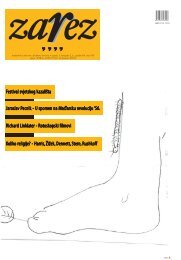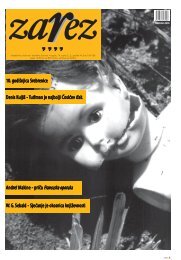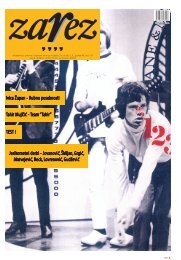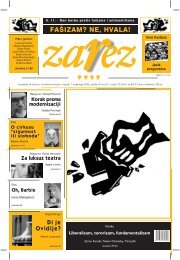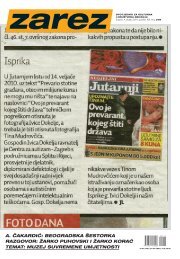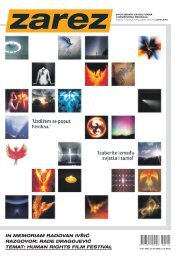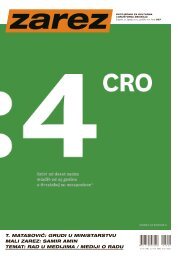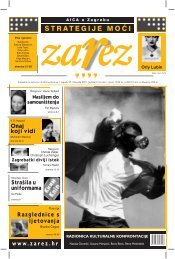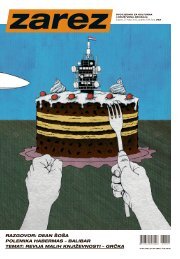24 II/40, 12. listopada 2,,,.Miljenko JergoviæMamma Leonepublished by Durieux, Zagreb, 1999f the futuredevelopmentof MiljenkoJergoviæ’sfictional style oncehe “exhausted” thesubject of war andrecent Bosnian historywas ever in anydoubt, after readingMamma Leone, wecan rest assured,knowing that whateversubject he chooses, it will be worth ourwhile. Instead of expanding his thematic horizons,what Jergoviæ achieves with his newbook is quite the o<strong>pp</strong>osite: he narrows thenarrative focus to present a precise and magnificentmicroworld of a family. The mainpart of the book (twenty one short storiesentitled When I Was Born, A Dog Barked inthe Corridor of the Maternity Ward) is reservedfor stories evoking the writer's earlychildhood, his grandparents, family atmosphereand himself as a little boy. In resolvingthe question of his own cultural identity (interms of writer's homeland, city and generation),Jergoviæ sorts out his biological "affiliation"as well. But the cultural forms arewhat really counts: Mamma Leone talksabout hit songs, homemade compotes andliqueurs, holidays and toys, vacations andgrieving. In this respect, Jergoviæ writes inthe memoir vein characteristic of ninetiesCroatia, and it is precisely the autobiographicalgenre that has produced the best workon the domestic literary scene of the period.(...)While it would be an exaggeration to callMamma Leone, as Rizvanoviæ did, "the best<strong>Croatian</strong> fiction published in the last fifteenyears", it certainly ranks among the bestbooks of the decade. Furthermore, it is thebest, most balanced Jergoviæ's book so far(this is his third work of fiction). The reasonfor its quality is quite simple: Jergoviæ hasmanaged to find a new formula for an age-oldsubject.Today, demonstrating how insistentlywriting about childhood haunts the contemporaryauthors is no longer necessary. InFlauber's Parrot, Julian Barnes has alreadymentioned that every writer has a right toone inadmissible book per oeuvre, but nomore than that. Jergoviæ is obviously heavilyinfluenced by this "one inadmissible book".When we read about old railwayman studyingHungarian dictionary and railway timetables,Jergoviæ unmistakably reminds uswho the Grandfather of this book is: afteridentifying the writer's close relatives incarnatedin Carver, Sidran, Chekhov andAndriæ, the overall winner undoubtedly turnsout to be Danilo Kiš. The content ofMamma Leone is unique only if we considerevery individual experience unique, which ishardly the best way for an author to achievesubject matter autonomy.In every single story featured in the firstpart of the book (twenty one in all),Jergoviæ blends the writing techniques of essay,short story and fragmented autobiography.He follows the free flow of associationsand writes without the firm narrativestructure, anchoring his style in imagesdrawn from childhood memories. The mainmotive of the story is usually revealed or establishedin the last third of the text, whichis why the whole textual dramaturgy slightlyresembles the one used by neorealists.Jergoviæ concludes most of his stories byreactivating the motive from the very beginningof the text, and it is not rare to see himadditionally emphasizing the motive byjuxtaposing it with surprising story-titles(for instance, If You’re Sure You Saw A Car,Do Tell Me). Short fiction experts will immediatelyspot Raymond Carver’s footprintsin this method, except that Carver, muchlike Joyce, is the kind of writer who recognizeshis main point; Carver finds it in a gesture,action, plot reversal or dialogue. Jergoviæprefers to pronounce his main thesis; his fi-nal point comes as an obvious conclusion tothe associative flow. This is why Jergoviæ neverstrays too far from essayist writings. Butthis is also what makes the book so special:stories in Mamma Leone deviate from themainstream of the twentieth century shortfictionfar more than any of his previousworks (...)To be honest, it is fair to say that MammaLeone contains quite a few ordinary stories.By that I mean the eleven stories from thesecond part of the book, called On ThatDay, A Childhood History Was Coming To AClose. Despite that, this book represents themost balanced and coherent, in short, thebest short-fiction cycle Jergoviæ has everwritten. What fascinates the most is theirthematic exclusivity: most of them describeexiled citizens of Sarajevo, former neighbors,lovers and schoolmates, now scattered allover the world, from Israel to Canada. Allthe stories in the second part are also melodramaticlove stories, preoccupied withlovers' unions and separations, their longingand broken hearts. Jergoviæ, it a<strong>pp</strong>ears, againpractices his avowed passion for melodrama(let us not forget his well-known declarationthat writer's ha<strong>pp</strong>iness is making readerscry). Barring the too obviously Marquesianstory called The Second Kiss of Gita Danon,the second part of Jergoviæ's book containsabsolutely first-class melodramaticstuff.Probably everyone today (apart fromrampant literary dogmatists) fully realizeshow difficult it is to write with respect forsentimentality, and that is why Jergoviæ remainsa rare example of the writer who succeedsin melodrama – not only in his fiction,but also in other genres he tackles. This ishis central quality. Of course, there willalways be people who hate bringing papertissues to the movies, preferring instead tocrack jokes while heart-rending violins weepin the background, but Mamma Leone wasnever meant for them. This mamma is oldfashionedand simple; just like the sunset itself.Ðermano SenjanoviæJurica PavièiæUS&A (UnitedSplit & America)illustrated by Branko Efendiæ-Efi, publishedby Durieux, Zagreb: 1999ermano Senjanoviæ, also knownas “Chicho”, requries no specialintroduction for the faithful readersof his satirical column in Feral Tribune.However, if you prefer the rightwing<strong>Croatian</strong> Letter and need furtherexplanation, Senjanoviæ actually writesseveral columns: Dora's Diary, parts ofLuminino's Mailbox, Beef (a TV column)and finally, he is the author of themost puzzling crossword puzzle in theworld. Aside from his previous collectionof Dora's Diary columns, US&A isSenjanoviæ's first fictional work. It containsbrief accounts of Senjanoviæ's stayin America during the spring of 1998.Senjanoviæ invited his compañero MiljenkoSmoje to accompany him on thetrip, despite Smoje's temporary residencein the Other World. Once youread about Senjanoviæ’s and Smoje’s adventuresin America, you will find it hardto believe that Smoje is deceased.Bringing Smoje back to life means bringingback the spirit we used recognizeas a Split’s trademark; nothing capturedthat spirit the way Smoje’s literarychronicles did. Its strongest weapon ishumor, ranging from parody to sarcasm.Senjanoviæ is not afraid of self-irony(at one point, Smoje tells him: Chicho,you know, I've been thinking aboutyou, and I came to the conclusion thatyou really are an absolute idiot), and it isprecisely his self-irony that givesSenjanoviæ the right to parody (throughSmoje's lips) American customs, <strong>Croatian</strong>politics, literary usurpers and notablenames in <strong>Croatian</strong> society (plussome names from the book list forschoolchildren), his compatriots fromSplit, philistines and a few dead people.Senjanoviæ refuses to idolize, which iswhy Smoje gets his spanking too. Why?In America, obsessed with healthy food,Smoje insists on his old habits, so hesmokes, drinks and eats with completedisregard for his health. And he seducesthe air-hostess.Senjanoviæ uses America only as anexcuse, a mask. The real aim of thebook, I su<strong>pp</strong>ose, was to commit to papera part of the memories, conversationsand lectures connected with Smoje,"because I owe itto him, to myselfand everythingand everyonewho loved Smoje”,writes Senjanoviæ.If suchdebts can be repaidat all, Senjanoviæhas paidthem off with interest.Zoran FeriæAngel RanOffsideDušanka Profetapublished by "Naklada MD", Zagreb 2000t took onlytwo collectionsofshort fiction (WaltDisney’s Mousetrap,1996 and AngelRun Offside, 2000),by Zoran Feriæ, aforty-year old teacherfrom Zagreb,to put an end to afrustrating phenomenonthat hasplagued the <strong>Croatian</strong> literary studies for along time - the phenomenon of "the missinglink". Namely, <strong>Croatian</strong> criticism has forseveral decades despaired about the generationgap between the first generation offantasists, born in the fifties (Tribuson,Ugrešiæ) and the second one, better knownas the "post-fantasy" or the war generation,born during the sixties (Jergoviæ, Tomiæ,Perišiæ...). To put it simply, this problemwas usually addressed in the followingmanner: "Why did the Quorum generationfailed to produce a fiction writer?". Theproblem is actually more far-reaching thanthe question suggests: the generation gaphas left its mark not only in fiction, but infilm and theatre production too. A<strong>pp</strong>arentlythe forty-something generation did nothave much interest in pursuing creativewriting in their formative years, which isprobably the reason why so few of themwork in the cultural field. Zoran Feriæ (b.1961) has gone some way towards closingthat generation gap, by providing <strong>Croatian</strong>literary studies with the sense of continuityand homogeneity in fiction, so beloved bylocal critics.Seen from another angle, Feriæ is a "pure"writer. It is not an accident that the panegyricreviews of Feriæ's book Angel RunOffside praise the fact that Feriæ is interestingprecisely as literature, without any "outsideinfluences" that might "pollute" him.And by "outside influences" everyone ofcourse means socially vehement political orthematic provocations.Furthermore, we should never forgetFeriæ’s sensitivity to literary nuances. Hismeandering, inticately structured storieswithin-the-storiesin the style of Chineseboxes, are a good example of mature postmodernisttake on fiction. This style isperfectly in sync with academic literary tastesof <strong>Croatian</strong> critics, famous for theirloathing of mainstream writing (we shouldn’tjudge them too harshly: mainstream isa rather fragile plant in the literary habitatof our homeland).Academic criticism notwithstanding,Feriæ is not an academic writer, nor is he ameta-literary fiction writer from the universitylecture-room. There is enough madness,sickness, oral sex, death, vulgarities andincest to place him with absolute certaintyfar, far away from drawer reserved for literaryescapists and "pure" theorists. If wemay use the term without the ideologicalburden it carries, Feriæ is an "existential"writer.Angel Ran Offside, the new collection ofshort stories by the writer who used to belongto Quorum generation, consists of nineshort stories. Feriæ is not a very productivewriter and he does not change his writingstyles dramatically: Angel Ran Offside is verysimilar to his previous book, Walt Disney’sMousetrap. What unites them is the atmosphereof grotesque, evil and treachery. Thefirst thing to notice while reading the contentsis disparity of story lengths. The bookoffers longer fiction forms, with complicatedplotlines and multiple fabulation (like AmorphousForms, Symmetries of Miracles, Bluesfor the Lady With Red Spots), but there are alsoworks closer to the pattern of classicalshort story (like Island on the Kupa River, ASad Fairytale about Clara Schumann and theBrothers Grimm). (...)Feriæ is not a typical "slice of life" masterlike Carver, Chekhov, Jergoviæ or Tomiæ. Heis not a champion of punchline conclusions,effective plot-reversals and the usual dramaturgyof the short story genre. His stories arebuilt on the strategy that Hollywood used tocall "high concept": a powerful pun aroundwhich the whole story slowly develops. (...)Part of the Feriæ's stories completely discardsthe organizing principle in the rest ofthe book. Instead, they are structured likeChinese boxes, with extremely loose outerframe. As a rule, this frame is bizarre. For instance:a group of people in the immunologyclinic are waiting to find out whether theyare HIV positive or not; or: a group of localeccentrics is attending a funeral of a fouryearold girl, somewhere on the remote Adriaticisland... The loose frame "melts" intoseveral directions, and, very similar to HerodotusHistories, spreads like an oil spilloveracross the water surface. Heroes of the storyor the narrator himself disturb the frame bypersonal memories, retrospective analysis oftheir history, anecdotes from the time elapsed,various references to past events, or hiddenironic subversions of the action that takesplace in the moment of narration. (...)If they were not organized as the collectionof short stories, Feriæ's petite parableswould strongly remind us of the terrible andmagnificent miniatures from the black chroniclesof Thomas Bernhardt, and when I sayBernhardt (especially in Voice Imitator) I amnot just casually dro<strong>pp</strong>ing the great name. Itis not by accident that Feriæ's first book wasimmediately translated into German and offeredto Austrian reading-audience (publisher:Folio Verlag). It is not unusual that Feriæwas quickly embraced by the Austrian public.There is something deeply Austrian andMiddle-European in the misanthropy andblack humor of Feriæ's fictions.And I do not mean Middle-European inthe sense of tasteful Mozart candies and Lipizanerhorses that shaped and polluted the<strong>Croatian</strong> perception of Middle Europe duringthe nineties (thanks to ideological propaganda).Feriæ's Middle Europe is not a Spanishriding school nor has it anything to do withStrauss' and chardash dances. It is MiddleEurope as "the rectum of Europe, a place thatanyone with brains will flee as soon as theypossibly can” (according to Paolo Magelli).It is the place of incest, arsonists, suicides,morbid neighbors and provincial malice bestdescribed by Austrians themselves: ThomasBerhardt, playwright Werner Schwab in hisplay Die Präsidentinnen and Michael Hannekein his movies.Jurica Pavièiæ
II/40, 12. listopada,,,. 25Branko MalešLittle Love Affairspublished by Naklada MD, Zagreb, 2000ollected underthe titleLittle LoveAffairs is a numberof different textswritten by a wellknown<strong>Croatian</strong> critic,poet and essayistBranko Maleš in thepast two years. It isvery hard to categorizethese texts bynormal standards of literary criticism; one hasto take into account author’s wide range of interests,which in this book include sports, philosophy,art and politics. My impression is thatMaleš’s writing should be seen as essayistic,with all the aesthetic breadth that the term implies.Whatever the case, by injecting artisticovertones and artificiality into the most banaleveryday circumstances, Little Love Affairstransgresses the classic boundary between theworld and the text. Maleš's collection of essaysmakes the most sense when compared withMichel Tournier's Petit Proses.On the other hand, his writing is relaxed,fragmented and heavily influenced by rockmusic. I quote the opening passage from theeponymous essay in Little Love Affairs: "Whydo I like dirty girls in commando jackets, withcigarettes hanging from their lips? Girls whodrink heavily, smoke passionately and play billiardin exotically named filthy bars somewherein the suburbs? Why am I allergic to girlswho never set foot in any suburb at all; or anorexicmodels in the company of large-mustachedbigshots from some obscure footballteam? It is because I love the margin and theurban Left connected with it." I think this"rocking" and relaxed passage gives a pretty accuratetaste of what follows later, including thepoetics of urban spaces and the author's idealizationof the whole social reality (and thereforehis obvious naivete). That is why the realsubject of the book is the repression, the denialof everyday reality, where the author turns hishead away from the decade during which theconservative Right has shown its ugliest face.The real question about Maleš's book is thereforethis: how could an enlightened modernistsuch as Maleš survive all these years that effectivelydestroyed all of his ideals? And by idealsI don’t mean the rhetorical trickery that nowadayscomes under the heading of “pining forformer Yugoslavia”; I mean the modernist nostalgiafor universal values of solidarity, socialsensibility, ethnic tolerance. Today’s Left iscompletely on the defensive, which is why all"leftist stories/stories from/of the Left" soundmore or less unrealistic and utopian. The essentialquestion for the leftist author todayis the question of elementary survival. BrankoMaleš provides some modest answers,modeled on his own personal experience.Edo PopoviæYellow Snakes'Dreampublished by Moderna Vremena,Zagreb, 2000Rade Jarakt might be a good idea to a<strong>pp</strong>roachthis book with several "naive" questions.For instance: why is it that<strong>Croatian</strong> authors are at their most convincingwhen they write about the experienceof passivity, hopelessness and psychologicalstagnation of their characters; in otherwords, when they write about various"dead end" situations? Why is it that typicalmetaphors for Croatia in contemporarywriting (form Krlea to Robert Perišiæ)equate the country with a "swamp", "cheapdive", "mud", "quick sand", "desert"? Whythis insistence on the notion of powerlessness?(...)Dream of Yellow Snakes is the title of thefirst story in Popoviæ's book, and also thetitle of the entire book. It is written in thefirst person, although the epilogue explainshow the previous pages were really "foundby accident" by the posthumous "editor" ofRaf's (the dominant narrator) personal notes(resembling a diary). It is therefore obviousthat Popoviæ does not experiment onthe level of plot or compositio. On thecontrary, his references are firmly groundedin narrative styles of Bukowski andHenry Miller, Cortazar and Carlos Fuentes,and many other writers of postmodernist"urban fiction". Notwithstanding theecstatic praise that Popoviæ received fromhis generational colleagues and fellow authorsfor his allegedly "baroque prose style",in my opinion, the talk of Popoviæ's "baroque"elocutio is utterly unfounded. Althoughhis second work of fiction aboundswith verbal puns, he never enters the realmof baroque hyper-rhetorization. The realnovum of this book lies in the subtle, butconsistent stylistic skill of metaphoricallyinterconnecting the stories and their motivesinto awhole that– undercloser scrutiny– resemblesa"hidden"novel. Moreover,Popoviæ isinnovativeand poeticallysophisticatedabouthislexicalchoices,thereby creating a thoughtful and suggestivenarrative tone, a tone that employs verydifferent language-styles, from colloquialspeech to standardized language. The authorhas a musically accurate feeling for therhythm of language and for playing with"a<strong>pp</strong>ropriate" and "provocative" sentencenuances. With Popoviæ we have thereforegained a writer who not only hears, but alsotests the boundaries of contemporarylanguage. Whether readers share his thematicinterests is an altogether differentquestion: personally, I do not considerexcessive use of alcohol a heroic mode ofbehavior (to say nothing of its unoriginalityas a literary subject), nor do I think thatsexual consummation without intimacyimplies the ultimate in human ha<strong>pp</strong>iness.(...)In the second story, Under the Rainbow,Popoviæ shifts our attention from drunkardsto soldiers. He resemanticizes the motivesof "sleep" from the first story, but nowhe talks about "sleeping in the snake pit"(i.e. in the trenches), where the exhaustedcharacters even manage to dream from timeto time. War becomes a variation on debasedhumanity and company of men introducedin the previous story. (...)In his war stories, but also in his storiesthat take place during peacetime, Popoviætreats women like commodity: "I can payfor her, I can have her for free... She is wearingan extremely short skirt, she spreadsher legs wide open, no panties." Only in thethird story, called In the Spider's Web, dowomen acquire faces to go with their genitals.(...) Here the subplot, symbolicallymore important than the main plot, dealswith the young couple's neighbor, Ms. Ingrid.She has spent practically her entire lifenurturing an almost sacral belief in the kindof love that is truly ascetic, absolute,boundless, tragic. This notion of love representsthe third dream of the yellow snakesin the book: the dream of her inabilityto face the real risk of emotional surrender- therefore the dream closely related to anticipationof death (...)In light of another local-patriotic paradox,we should admit that while Popoviæ's"novel" does in fact thematize the passivephilosophy of defeat, it simultaneouslyperforms active revalorization of the culturalspace he describes.Nataša GovediæOzren KeboSarajevofor BeginnersFeral Tribune, Split, 2000he actions of the primitive mindthat was destroying Sarajevo forthree years have found their chroniclerin Ozren Kebo and his story aboutthe survival of the people in Sarajevo. Thetitle for beginners refers to those who livein Sarajevo today, regardless of whetherthey have remained in the city for the durationof the war or whether they returnedafterwards from various voluntary or imposedexiles. They all start building, loving,living from the beginning, after years ofmere surviving. Thematically different writingshave a common underlying concept:the disa<strong>pp</strong>earance of the city, its people,and good old ways. Kebo’s basic thesis,that everything is made of illusion and thathuman wisdom is revealed to the degree inwhich one is conscious of that illusion, inone’s caution, and in the energy that oneinvests against the belief that anything canlast long. The first in a series of illusions,which the author will gradually disclose, isthe one about the world in which there areUnited Nations, Declaration on HumanRights, and a number of other declarationswhich guarantee some kind of human rightto each and every citizen of the world. Atthe moment when the first projectiles werelaunched from Pale, Sarajevo was abandoned.Now Karadiæ was making decisionson human rights. The illusion that theworld would intervene proved the worst ofall illusions for those who waited for thebombing to stop. In a shell of surroundedSarajevo, everything that makes normal citylife had to be forgotten. For instance,those who invested their money and timein creating a family library first had to decidewhether to use the books as kindling,then watch their pages disa<strong>pp</strong>ear in flames,and finally learn to live with the fact that inthis part of the world that we prefer not tocall the Balkans, the family library is alsoan illusion, an enormous one. Kebo’s writingsare structured as a string of notesdealing with the same topic, sometimescomprising of only a line or two, sometimesfilling a single page. They synthesizewhat the author had witnessed, what hehad heard, and, most importantly, what hehad learned about war and peace, abouthimself and the people around him.Dušanka ProfetaBorivoj RadakoviæNo, This is NotMe (Yes, I'm Notthe One )published by Celeber, Zagreb, 1999inguistic potency of Borivoj Radakoviæ,the foremost scatologicalgenius of <strong>Croatian</strong> literary scene,remains the most important energeticsource for the book No, This is Not Me(Yes, I'm Not the One). Sentences imbuedby punk rock vehemence are immediatelyfollowed by calmer, more stylistically preciseexpressions, but the level of verbal aggressionbuilds up steadily throughout thebook. This is why I feel obligated to warnthe reader of what lies ahead: if you are notprepared to step out of the "shit of sentimentalismand realism", you will have seriousdifficulties digesting Radakoviæ's hardcorewriting, to say nothing of his academicposture. Despite the basic elegiac narrativetone, brutalities, bestialities and verbalexhibitionism prevail. Although author'snihilism stems from his exhausted pacifism,which has been forced to turn intoviolence while struggling against it, the finalresult is fiction that shocks, written "inspite of everybody and to everyone's horror".(...)Reader gets the book of "hot" content and"boiling" vocabulary, treating subcultural issueslike sex, drugs and violence with cynicismand pathos. However, the writer disguisesthese elements with elitist rhetoricof "art about art". In order to "heat" the coldand socially idle style that marks the surfaceof his work, Radakoviæ exaggerateseverything: from the loneliness that su<strong>pp</strong>osedlyleads to lust to the eroticism presentedthrough pornography, or fear raised byrepression and pacifism expressed by aggression.(...)Hiding behind the title No, This Is Not Me(Yes, I'm Not the One) Radakoviæ weaves afabric of truly autoreferential records, sometimesmilitant and self-congratulatory,sometimes tired and whining, but alwaysmocking the position of godlike authorsand voyeuristic readers (regardless of howsimultaneously exciting and humiliatingthe latter position may be). By stri<strong>pp</strong>ingdown the methodology of conventionalnarrative procedure until we are faced withthe "naked intimism" of the narrator himself,Radakoviæ sticks his tongue out withobvious pleasure, inviting the gentle readeron the spiritual Odyssey through the duodenum,small intestine and large intestine.The last story catapults the reader directlyfrom the rectum into the world of violence.And it is exactly violence cum language,violence over the language as well as linguisticviolence, that constitutes the thematicand stylistic axis of Radakoviæ's poetics.No, This Is Not Me (Yes, I'm Not the One)is a book of powerlessness and anger, oftenemotional, sometimes pretentious, butmostly sincere. It won't spiritually euthanizeits readers, but it will, eloquently and vividly,reiterate the same message Ed Sandersconveyed long ago with the cover of his“FUCK YOU” magazine…Andreja Gregorina
- Page 2 and 3: 2 II/40, 12. listopada 2,,,.gdje je
- Page 4 and 5: 4 II/40, 12. listopada 2,,,.Davorka
- Page 6 and 7: 6 II/40, 12. listopada 2,,,.Nakladn
- Page 8 and 9: 8 II/40, 12. listopada 2,,,.Andrea
- Page 10 and 11: 10 II/40, 12. listopada 2,,,.Pjesni
- Page 12 and 13: 12 II/40, 12. listopada 2,,,.U uvod
- Page 14 and 15: 14 II/40, 12. listopada 2,,,.Irena
- Page 16 and 17: 16 II/40, 12. listopada 2,,,.o you
- Page 18 and 19: 18 II/40, 12. listopada 2,,,.n her
- Page 20 and 21: 20 II/40, 12. listopada 2,,,.In you
- Page 22 and 23: 22 II/40, 12. listopada 2,,,.Roman
- Page 26 and 27: 26 II/40, 12. listopada 2,,,.Sonja
- Page 28 and 29: 28 II/40, 12. listopada 2,,,.Marink
- Page 30 and 31: 30 II/40, 12. listopada 2,,,.Igor M
- Page 32 and 33: 32 II/40, 12. listopada 2,,,.eljko
- Page 34 and 35: 34 II/40, 12. listopada 2,,,.FRAKCI
- Page 36 and 37: 36 II/40, 12. listopada 2,,,.Miljen
- Page 38 and 39: 38 II/40, 12. listopada 2,,,.Sonia
- Page 40 and 41: 40 II/40, 12. listopada 2,,,.Marink
- Page 42 and 43: 42 II/40, 12. listopada 2,,,.Igor M
- Page 44 and 45: 44 II/40, 12. listopada 2,,,.eljko
- Page 46 and 47: 46 II/40, 12. listopada 2,,,.Frakci
- Page 48: 48 II/40, 12. listopada 2,,,.Hrvoje



